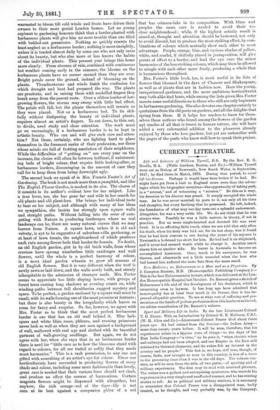CURRENT LITERATURE.
went out as Bishop of Newcastle, New South Wales, in September, 1817; he died there in March, 1879. During that period, he never left his diocese. Perhaps it would have been better if he had. He might have got from a visit to England more even than the advan-
tages which his biographer mentions—the opportunity of taking part, in a "retreat," and of witnessing a "mission." Be this as it may, his devotion to his diocese was grand. It simply occupied the whole man. As he was never married, he gave to it, not only all his time and thoughts, but every farthing that he possessed. He left, indeed, the foundation of what may one day tarn out a splendid endowment. Altogether, his was a very noble life. We do not think that he was always wise. Possibly he was a little narrow, in theory, if not in practice. Bat no more single-hearted and devoted life was ever lived. It is an affecting little touch, when we are told that only after his death, when his body was laid out for its last sleep, was it found that he had been content to use daring the years of his sojourn in Newcastle a bedstead too short for him. He had had it on shipboard, and it never had seemed worth while to change it. Another touch shows him on another side. He learnt in Australia to become an accomplished horseman. Once, much to his annoyance, he was thrown, and afterwards not a little consoled when the host who had horsed him suffered the same fate from the same steed.


































 Previous page
Previous page